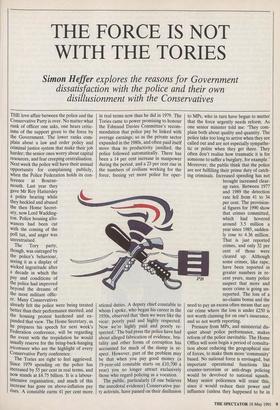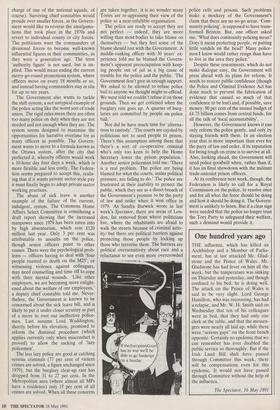THE FORCE IS NOT WITH THE TORIES
Simon Helfer explores the reasons for Government
dissatisfaction with the police and their own disillusionment with the Conservatives
The Tories are right to feel aggrieved. Since 1979 spending on the police has increased by 55 per cent in real terms, and now stands at £4.75 billion. It is a labour- intensive organisation, and much of this increase has gone on above-inflation pay rises. A constable earns 41 per cent more in real terms now than he did in 1979. The Tories came to power promising to honour the Edmund Davies Committee's recom- mendation that police pay be linked with average earnings; so as the private sector expanded in the 1980s, and often paid itself more than its productivity justified, the police followed automatically. There has been a 14 per cent increase in manpower during the period, and a 23 per cent rise in the numbers of civilians working for the force, freeing yet more police for oper- ational duties. A deputy chief constable to whom I spoke, who began his career in the 1950s, observed that 'then we were like the vicar: poorly paid and highly respected. Now we're highly paid and poorly re- spected.' The bad press the police have had about alleged fabrication of evidence, bru- tality and other forms of corruption has accounted for much of the slump in re- spect. However, part of the problem may be that when you pay good money (a 19-year-old constable starts on £10,700 a year) you no longer attract exclusively those who regard policing as a vocation.
The public, particularly (if one believes the anecdotal evidence) Conservative par- ty activists, have passed on their disillusion Pressure from MPs, and ministerial dis- quiet about police performance, makes reform of the police inevitable. The Home Office will soon begin a period of consulta- tion about reducing the geographical size of forces, to make them more 'community' based. No national force is envisaged, but important operational functions like counter-terrorism or anti-drugs policing would be devolved to national squads. Many senior policemen will resist this, since it would reduce their power and influence (unless they happened to be in charge of one of the national squads, of course). Surviving chief constables would preside over smaller forces, as the Govern- ment would like to reverse the amalgama- tions that took place in the 1970s and revert to individual county or city forces. The politicians want the commanders of divisional forces to become well-known influential figures in their communities, as they were a generation ago. The term `authority figure' is not used, but is im- plied. This would mean ending the current merry-go-round promotions system, where officers move on every 18 months or so, and instead having commanders stay in situ for up to ten years.
The Government also wants to tackle the shift system, a not untypical example of the police acting like the worst sort of trade union. The rigid rules mean there are often too many police on duty when they are not needed and not enough when they are. The system seems designed to maximise the opportunities for lucrative overtime for as many officers as possible. The Govern- ment wants to move to a formula known as the Ottawa system, after the city that perfected it, whereby officers would work a 10-hour day four days a week, which is more flexible and less costly. The Federa- tion seems prepared to accept this, realis- ing that if it wants private sector-style pay it must finally begin to adopt private sector working practices.
The abuse of sick leave is another example of the failure of the current, indulgent, system. The Commons Home Affairs Select Committee is considering a draft report showing that the increased manpower since 1979 has been eaten into by high absenteeism, which cost £120 million last year. Only 3 per cent was attributable to assaults on the police, though senior officers point to other causes. There were the psychological prob- lems — officers having to deal with 'four people roasted to death on the M25', or witnessing violence against colleagues, may need counselling and time off to cope with their mental wounds. 'Like other employers, we are becoming more enlight- ened about the welfare of our employees,' a deputy chief constable told me. Never- theless, the Government is known to be concerned about the sick leave bill, and is likely to put it under closer scrutiny as part of a move to root out ineffective police- men. Last autumn Lord Waddington, shortly before his elevation, promised to reform the dismissal procedure (which applies currently only when misconduct is proved) to allow the sacking of 'lazy policemen'.
The less lazy police are good at catching serious criminals (77 per cent of violent crimes are solved, a figure unchanged since 1979), but the burglary clear-up rate has dropped from 31 to 27 per cent. In the Metropolitan area (where almost all MPs have a residence) only 13 per cent of all crimes are solved. When all these concerns are taken together, it is no wonder many Tories are re-appraising their view of the police as a near-infallible organisation.
The police are ready to accept they are not perfect — indeed, they are more willing than most bodies to take blame on themselves — but they feel some of the blame should rest with the Government. A middle-ranking officer with 30 years' ex- perience told me he blamed the Govern- ment's apparent preoccupation with keep- ing people out of jail as a big cause of trouble for the police and the public. 'The Government don't give us enough support. We asked to be allowed to refuse police bail to anyone we thought might re-offend. We were told we couldn't refuse it on those grounds. Then we get criticised when the burglary rate goes up. A quarter of burg- laries are committed by people on police bail.'
Nor did he have much time for 'alterna- tives to custody'. 'The courts are cajoled by politicians not to send people to prison. There's this assumption among them that there's a sort of co-operative criminal who's only too keen to help the Home Secretary lower the prison population.' Another senior policeman told me: 'There is a real problem. The police are being blamed for what the courts, under political pressure, are failing to do.' The police are frustrated at their inability to protect the public, which they see as a direct breach of the Government's promise to be the party of law and order when it won office in 1979. As Sandra Barwick wrote in last week's Spectator, there are areas of Lon- don, far removed from where politicians live, where the inhabitants are afraid to walk the streets because of criminal activ- ity: but there are political barriers against protecting those people by locking up those who terrorise them. The barriers are political oversensitivity about race and a reluctance to see even more overcrowded police cells and prisons. Such problems 'make a mockery of the Government's claim that there are no no-go areas. 'Com- munity policing', is supposed to have trans- formed Brixton. But, one officer asked me, 'What does community policing mean? Does it mean protecting people, or patting little vandals on the head? Many police- men I know would rather resign than have to live in the area they police.'
Despite these resentments, which do not make dialogue easy, the Government will press ahead with its plans for reform. It needs to restore public confidence (though the Police and Criminal Evidence Act has done much to prevent the fabrication of evidence that caused so much of that confidence to be lost) and, if possible, save money: 90 per cent of the annual budget of £4.75 billion comes from central funds, for all the talk of 'local accountability'.
However, the Government knows it can only reform the police gently, and only by staying friends with them. In an election year that is more important than ever for the party of law and order, if its reputation for being tough on crime is to survive at all. Also, looking ahead, the Government will need police goodwill when, rather than if, it has its final showdown with the militant trade-unionist prison officers.
At its conference next week, though, the Federation is likely to call for a Royal Commission on the police, to resolve once and for all what the force should be doing and how it should be doing it. The Govern- ment is unlikely to listen. But if a clear sign were needed that the police no longer trust the Tory Party to safeguard their welfare, such a demand would provide it.



























































 Previous page
Previous page